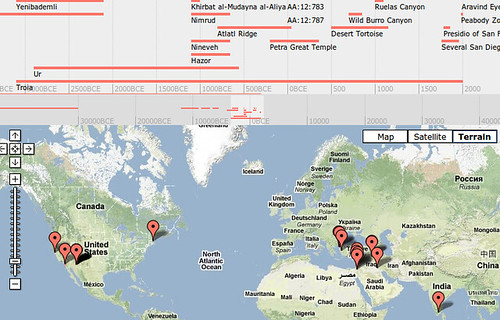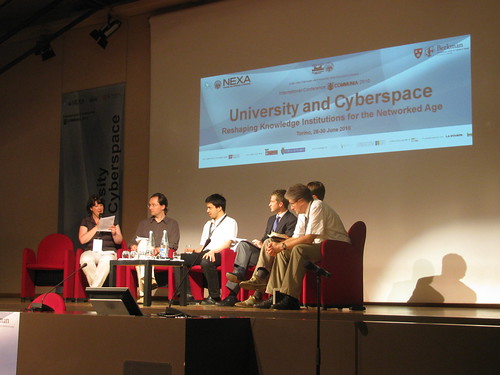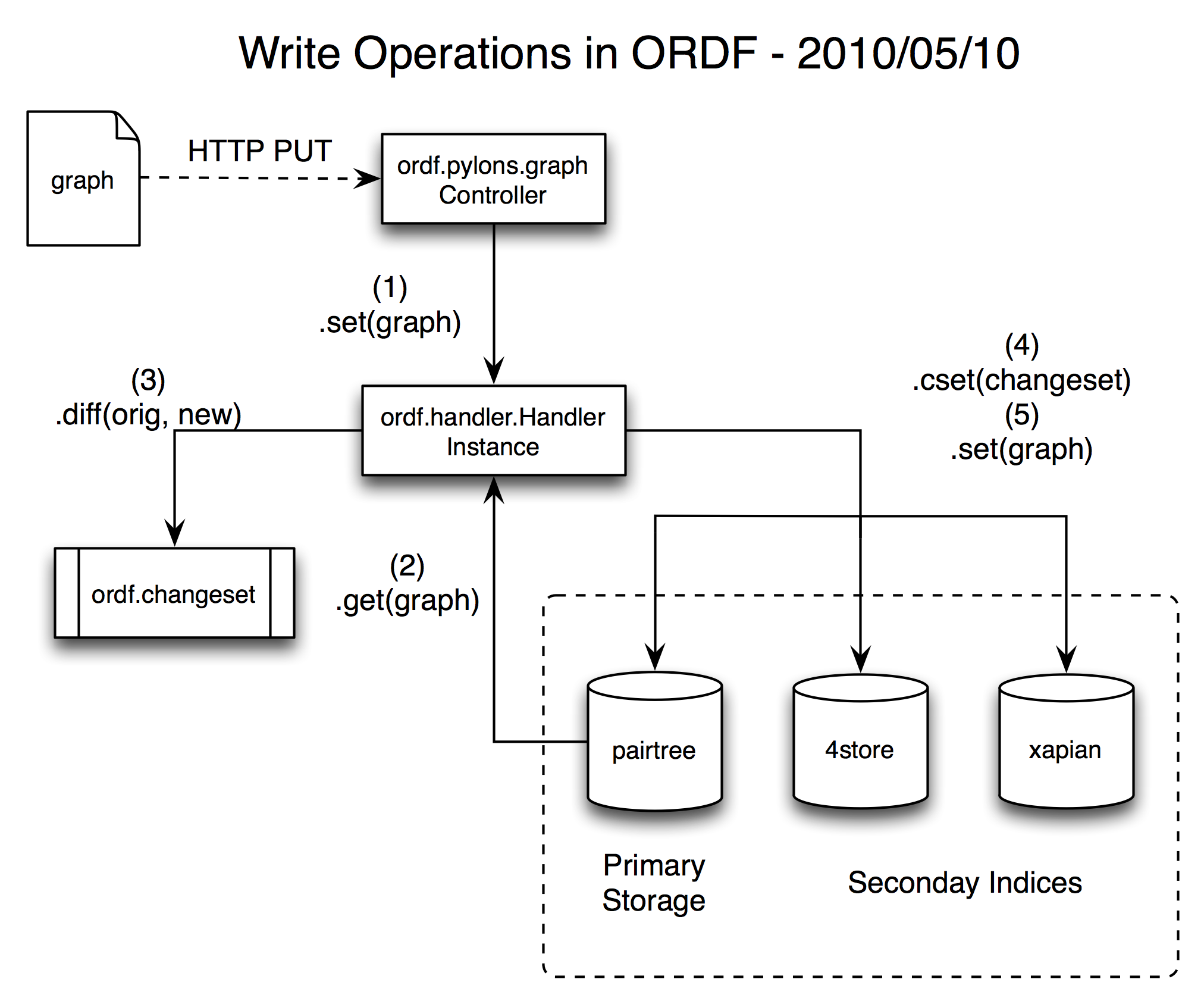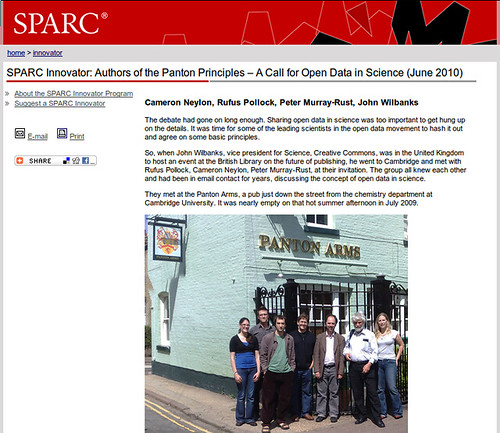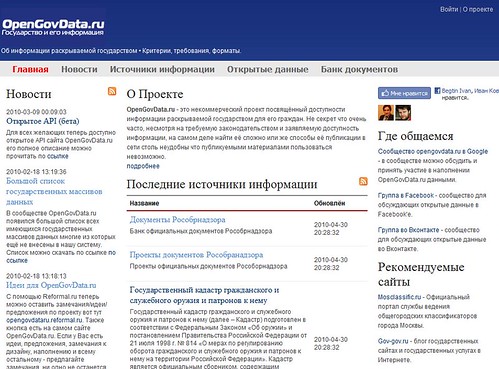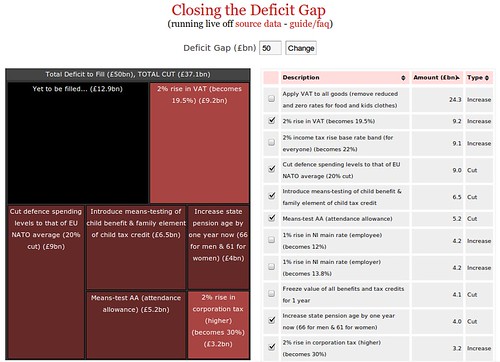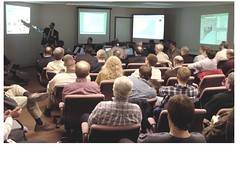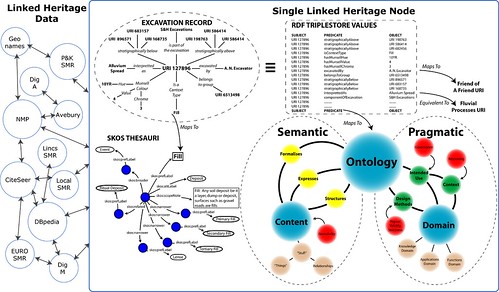Don't miss a thing! Stay on top of what's happening in the #OpenMovement around the world.
About Inferencing
Inferencing, or machine reasoning has a slightly unsavoury reputation perhaps stemming from the failure of Strong AI and its association with science fiction. This is a bit unfortunate and it could be argued that it has led Semantic Web technologies to be underdeveloped. With the Semantic Web and RDF we are concerned with simple statements, […]
Read moreGovernmental Linked Data Session, 28th September, Brussels
The Open Knowledge Foundation Working Group on EU Open Data is organising a session on linked data and open data at the ICT2010 event in Brussels later this year. Where? T 003, Brussels Expo When? 11:00-12:30 CET, 28th September 2010 From the blurb: This networking session will discuss how public access to government data – […]
Read moreOpen data and the voluntary sector
The following guest post is from David Kane, who is a research officer at NCVO. He blogs on NCVO’s website and can be found on twitter @kanedr. The author wishes to acknowledge Louise Brown from NCVO’s ICT and Collaboration Team for her valuable input. Here at the National Council for Voluntary Organisations (NCVO) we’ve recently […]
Read moreNotes and reflections from #ScotGovCamp
Yesterday I went to ScotGovCamp in Edinburgh and had a lovely time. Spent more of it chatting in the hallway than participating in the sessions; but have detailed notes from the Open Data session led by Chris Taggart of Openly Local, and scatterings from elsewhere. Open Data Chris cites his membership of OKF’s Open Government […]
Read moreInterview with European Journalism Centre on Data Driven Journalism
The following interview was published earlier this week by the European Journalism Centre in the Netherlands. In recent years the practice and philosophy of making data freely available for use and re-use has been taken up by many different institutions, from national governments to international organizations such as the World Bank. Journalists too have started […]
Read moreBelarusian translation of the Open Knowledge Definition (OKD)
We’ve just added a Belarusian translation of the Open Knowledge Definition thanks to Patricia Clausnitzer! http://www.opendefinition.org/okd/bielaruskaja/ If you’d like to translate the Definition into another language, or if you’ve already done so, please get in touch on our discuss list, or on info at the OKF’s domain name (okfn dot org).
Read moreData Driven Journalism, Amsterdam, 24th August 2010
I’m very much looking forward to an event on Data Driven Journalism in Amsterdam in late August, which will bring together representatives from various media organisations (e.g. The New York Times, The Financial Times, The Times, …) and other stakeholders for a day of talks and discussions on the role of new digital technologies in […]
Read moreIntroducing the Panton Papers
Peter Murray-Rust — Cambridge University chemist, Open Knowledge Foundation Advisory Board member and tireless advocate for open data in chemistry — has recently started a series of blog posts about open data, focusing on issues related to the Panton Principles for open data in science. The first is called Open Data: why I need the […]
Read moreHow to Visualise Worldbank Data with Google Maps
The following guest post is from Holger Drewes, who is a member of Open Knowledge Foundation Germany and the Open Data Network in Berlin. As interfaces for open datasets from political and societal institutions become more and more available, the possibilities for easy and uncomplicated data visualization are expanding in very promising ways. With a […]
Read moreOpen Data in Agriculture and Why It Matters
The following guest post is from Elizabeth McVay Greene, Founder of Food+Tech Connect. It was originally posted on Food+Tech Connect, Provenance and the Huffington Post. The farmer usually knows best — for his or her land, crop, livestock, and profitability, among other things. As a girl on a Minnesota farm in the ’80s and ’90s, […]
Read moreOne Information Policy for Freedom of Information and Re-use
The following guest post is from Katleen Janssen, researcher at the Interdisciplinary Centre for Law and ICT at Katholieke Universiteit Leuven, and member of the Open Knowledge Foundation’s Working Groups on EU Open Data and Open Government Data. In Belgium – and I can imagine this is the case in more countries – we look […]
Read moreOpening up university infrastructure data
The following guest post is from Christopher Gutteridge, Web Projects Manager at the Electronics and Computer Science (ECS), University of Southampton and member of the OKF’s Working Group on Open Bibliographic Data. We announced on Tuesday (13th July 2010) that all the RDF made available about our school would be placed in the public domain. […]
Read moreShould the Open Source Initiative adopt the Open Knowledge Definition?
Russ Nelson, License Approval Chair at the Open Source Initiative (OSI), recently proposed a session at OSCON about OSI adopting a definition for open data: I’m running a BOF at OSCON on Wednesday night July 21st at 7PM, with the declared purpose of adopting an Open Source Definition for Open Data. Safe enough to say […]
Read moreBriefing paper on “The Semantic Web, Linked and Open Data”
The following guest post is from Sheila MacNeill, Assistant Director of the JISC CETIS project. The Semantic Web, open data, linked data. These phrases are becoming increasingly commonly used in terms of web developments and information architectures. But what do they really mean? Are they, can they be, relevant to education? To help begin to […]
Read moreWhat was COINS missing? The mystery of the Government’s hidden spending data
The following article was originally published on the Guardian Datablog by Lisa Evans, the Lead Researcher on the OKF’s Where Does My Money Go? project. We thought we were getting everything with the COINS release. In fact we were missing the best part of all: the Whole of Government Accounts. Before he became chancellor George […]
Read morePollen data in the New and Old World
The following guest post is from Stefano Costa at the University of Siena. He is Founder of the IOSA initiative and Coordinator of the Open Knowledge Foundation‘s Working Group on Open Data in Archaeology. Stefano wishes to thank Thomas Kluyver and David Jones for their help in reviewing the post. Since the 19th century, the […]
Read moreOpen Context
The following guest blog is from Open Context’s Project Lead Eric Kansa and Editor Sarah Whitcher Kansa, who are both members of the Open Knowledge Foundation‘s Working Group on Open Data in Archaeology. About Open Context Open Context is a free, open access resource for the electronic publication of primary field research from archaeology and […]
Read moreWe Need Distributed Revision/Version Control for Data
In the open data community, we need tools for doing distributed revision/version control for data like the one’s that already exist for code. (Don’t know what I mean by revision control or distributed revision control? Read this) Distributed revision control systems for code, like mercurial and git, have had a massive impact on software development, […]
Read moreOpen data on Russian government spending
The following guest post is from Ivan Begtin, who is a member of the Open Knowledge Foundation‘s Working Group on Open Government Data. I would like to announce new open data project on Russian government spending… Background Russian Federal Law – 94-FZ of 21.07.2005 declared that Russian Federal Treasury and Russian regional procurement agencies should […]
Read moreA Big Part of COINS was not Published
This is a post by Lisa Evans, lead researcher on Where Does My Money Go?. When I saw the COINS data that was published at the beginning of June, I suspected there was something missing. I had been reading about the Whole of Government Accounts (WGA) — a project to provide a really good detailed overview of […]
Read moreWhat UK government data should be opened up next?
The Telegraph ask Open Knowledge Foundation Director Rufus Pollock and Chris Taggart of OpenlyLocal about what UK government datasets they’d like to see opened up next…
Read moreOpening up European public sector information: two recommendations
Last week I participated in the third (and sadly final!) conference of Communia project, a European thematic network on the digital public domain. The theme of this conference was University and Cyberspace and several of the talks articulated a vision in which universities, academics, and students play a key role in creating, curating and promoting […]
Read moreHacks and Hackers, Birmingham, 23rd July 2010
The good folks at Scraperwiki are organising an event for developers and journalists later this month in Birmingham, UK. Great to see them helping to connect the dots between people who build things with datasets and those who can help to put the data into context! You can sign up at: From the announcement: What? […]
Read moreThe Business of Open Data
The following guest post is from Hjalmar Gislason, an open data activist, member of the Open Knowledge Foundation’s Working Group on EU Open Data, and founder of structured data start-up, DataMarket. The rise of Open Data in the last 3-4 years is no news to anybody reading this blog. More and more public organizations are […]
Read moreThe Public Domain and the WIPO Development Agenda
The following guest post is from Séverine Dusollier, who is a Professor in Law at the University of Namur and a member of the Open Knowledge Foundation’s Working Group on the Public Domain. She recently completed a Scoping Study on Copyright and Related Rights and the Public Domain commissioned as part of the WIPO Development […]
Read moreThe open spending data that isn’t
The following guest post is from Chris Taggart of OpenlyLocal, who advises the Where Does My Money Go? project on local spending data, and is a member of the Open Knowledge Foundation‘s Working Group on Open Government Data. This is a cross-post — Chris’ original post here. When the coalition announced that councils would have […]
Read moreBad Science on Open Data
The following article is from Guardian columnist Dr Ben Goldacre and was originally published on his blog as “Nullius in verba. In verba? Nullius!”. He kindly allowed us to reprint it here. It discusses the pros and cons of publishing data in the context of investigative medical journalism. Ben Goldacre, Not In The Guardian, Saturday […]
Read moreORDF – the OKFN RDF Library
Some months ago we started looking at how we might possibly use an RDF store instead of a SQL database behind data-driven websites — of which OKF has several. The reasons have to do with making the data reuseable in a better way than ad-hoc JSON APIs. As we tend to program in Python and […]
Read moreDebategraph
The following guest post is from David Price, co-founder of Debategraph, a debate tool for visually representing complex debates. Debategraph provides a novel way for geographically dispersed groups to collaborate in real-time in thinking through complex issues. It does so by enabling groups of any size to externalise, visualize, question, and evaluate all of the […]
Read moreWordNet: A Large Lexical Database for English
The following guest post is from Christiane Fellbaum at Princeton University who is working on a statistical picture of how words are related to each other as part of the WordNet project. Information retrieval, document summarization and machine translation are among the many applications that require automatic processing of natural language. Human language is amazingly […]
Read moreInterview with Rufus Pollock for Guardian Activate event
Open Knowledge Foundation Director Rufus Pollock has been interviewed by the Guardian in the run up to its Activate Summit 2010 which will take place on Thursday. From the interview: How, in your experience, have web technologies been employed to make the world a better place? The internet and new digital technologies have had and […]
Read moreNew UK transparency board and public data principles
On Friday the data.gov.uk team announced the first meeting of a new Public Sector Transparency Board: The Board will drive forward the Government’s transparency agenda, making it a core part of all government business and ensuring that all Whitehall departments meet the new tight deadlines set for releasing key public datasets. In addition, it is […]
Read moreOpen Data Commons – Attribution License released
Open Data Commons has released a new Open Data Commons attribution license (ODC-By). Jordan Hatcher, Chair of the Open Data Commons Advisory Council, writes: Thanks to everyone for their feedback on the licenses and their help with the project. We can now announce a new license to the Open Data Commons family, the ODC Attribution […]
Read moreWhy Share-Alike Licenses are Open but Non-Commercial Ones Aren’t
It is sometimes suggested that there isn’t a real difference in terms of “openness” between share-alike (SA) and non-commercial (NC) clauses — both being some restriction on what the user of that material can do, and, as such, a step away from openness. This is not true. A meaningful distinction can be drawn between share-alike […]
Read morePanton Principle authors win SPARC Innovator prize!
We are delighted to announce that the authors of the Panton Principles have been awarded the SPARC Innovator prize! The principles are currently maintained by the Open Knowledge Foundation’s Working Group on Open Data in Science. From the announcement: Science is based on building on, reusing, and openly criticizing the published body of scientific knowledge. […]
Read moreOpen government data in Russia
The following guest post is from Ivan Begtin, who is a member of the Open Knowledge Foundation‘s Working Group on Open Government Data. I would like to give a brief overview of a few projects I have been working on related to open government data in Russia. OpenGovData.ru The first is OpenGovData.ru, which is a […]
Read moreEmergency Budget, Deficit and Cuts: Visualized
Today in the UK the Conservatives/Liberal Democrat coalition presented their Emergency Budget. Collaborating with David McCandless, Where Does My Money Go? have created a simple visualization to help you understand and contextualise the budget, and answer some basic questions such as: How much impact will the emergency budget have on the £156bn budget deficit? And […]
Read moreOpen Science Summit 2010, July 29-31, Berkeley
The following guest post is from Joseph Jackson, one of the main organisers behind the Open Science Summit. Dear Champions of Open Science, Please join us in gathering stakeholders seeking to liberate our scientific and technological commons to enable a new era of decentralized, distributed innovation. http://opensciencesummit.com/ While there are many great organizations and talented […]
Read moreSome final – and future – thoughts on the BioMed Central Open Data award
The following guest post is from Iain Hrynaszkiewicz who is Managing Editor at leading open access publisher BioMed Central and a member of the Open Knowledge Foundation’s Working Group on Open Data in Science. Having already been scooped by some encouraging and eloquent activity in the open data blogosphere here, here, here and here (perhaps […]
Read moreCan You Close the Deficit Gap?
Where Does Your Money Go? challenges you to beat the Chancellor to it before tomorrow’s budget and close the UK’s financial deficit. Will you increase taxes, make cuts or a mix of both? No decision is going to be popular but are some more palatable than others, you decide. More information: Closing the Deficit Gap […]
Read moreOpen Geoprocessing Standards and Open Geospatial Data
The following guest post is from Lance McKee, who is Senior Staff Writer at the Open Geospatial Consortium (OGC) and a member of the Open Knowledge Foundation‘s Working Group on Open Geospatial Data. As the founding outreach director for the Open Geospatial Consortium (OGC) and now as senior staff writer for the OGC, I have […]
Read moreConsuming the Transport for London Data
The following guest post is from Julian Todd, who works on projects such as Public Whip, UNdemocracy, and ScraperWiki. He is also a member of the Open Knowledge Foundation’s Working Group on Open Government Data.. The post was originally published on Julian’s blog, Freesteel. Yesterday Transport for London made a data dump of various locations […]
Read moreUnderstanding COINS
Something amazing has happened since the government spending recorded in the COINS database was made openly available to everyone. I’m talking about the impressive range of free, and in many cases open source, products to display the COINS data. So far there are COINS search engines from The Guardian and The Open Knowledge Foundation, graphs […]
Read moreOpen Correspondence
The following guest post is from Iain Emsley, who is a member of the Open Knowledge Foundation Working Group on Open Resources in the Humanities, and a contributor to the Open Shakespeare and Open Milton projects. Using the social graph, one can find the connections between seemingly disparate groups of people on different services. Most […]
Read moreLearning from Libraries: The Literacy Challenge of Open Data
The following guest post is from David Eaves who is the founder of datadotgc.ca, an open data portal powered by our CKAN software that crowdsources the location of open data sets in Canada (Canada has no equivalent of data.gov or data.gov.uk). David is also a member of the OKF’s Working Group on Open Government Data. […]
Read moreLaunch of it.ckan.net for open data in Italy!
The following guest post is by Stefano Costa and Federico Morando. Stefano Costa is a researcher at the University of Siena and Coordinator of the OKF’s Working Group on Open Data in Archaeology. Federico Morando is Managing Director & Research Fellow at the NEXA Center for Internet & Society and a member of the Working […]
Read moreDig the new breed, Part III – wrapping it all up
This is the third in the amazing series of guest blogs from Ant Beck on the impact of linked open data for archaeology. Part 1: New approaches to archaeological data analysis, as seen in the DART and STAR projects Part 2: Considering the ethics of sharing archaeological knowledge OK, to recap we have: A scientific […]
Read moreDig the new breed, Part II – open archaeology and ethics
The second in this great series of three guest blogs by Ant Beck. See Part 1 for applications of linked data and remote sensing in archaeology. Part 3 will wrap things up and talk about the disruptive implications of linked open data for impact of archaeology. Open Science provides the framework for producing transparent and […]
Read moreDig the New Breed: How open approaches can empower archaeologists- Part I
Very happy to post the first in an amazing series of OKFN guest blogs by Ant Beck, a member of the Open Archaeology working group. Ant discusses the DART project and the STAR project, both of which employed Linked Data in a heritage context. Later we’ll get into the ethics of open heritage, and a […]
Read moreBioMed Central Open Data Award: winner to be announced this week!
The following guest post is from Iain Hrynaszkiewicz who is Managing Editor at leading open access journal BioMed Central and a member of the Open Knowledge Foundation’s Working Group on Open Data in Science. All followers of this blog will know that science publishing now goes much beyond the traditional, IMRaD, journal article. As collective […]
Read more


